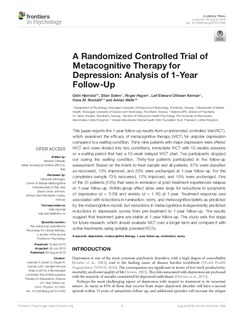A Randomized Controlled Trial of Metacognitive Therapy for Depression: Analysis of 1-Year Follow-Up
Hjemdal, Odin; Solem, Stian; Hagen, Roger; Kennair, Leif Edward Ottesen; Nordahl, Hans Morten; Wells, Adrian
Journal article, Peer reviewed
Published version
Permanent lenke
http://hdl.handle.net/11250/2610941Utgivelsesdato
2019Metadata
Vis full innførselSamlinger
- Institutt for psykisk helse [1301]
- Institutt for psykologi [3103]
- Publikasjoner fra CRIStin - NTNU [38127]
Sammendrag
This paper reports the 1-year follow-up results from a randomized controlled trial (RCT), which examined the efficacy of metacognitive therapy (MCT) for unipolar depression compared to a waiting condition. Thirty-nine patients with major depression were offered MCT and were divided into two conditions; immediate MCT with 10 weekly sessions or a waiting period that had a 10-week delayed MCT start. Two participants dropped out during the waiting condition. Thirty-four patients participated in the follow-up assessment. Based on the intent-to-treat sample and all patients, 67% were classified as recovered, 13% improved, and 20% were unchanged at 1-year follow-up. For the completers sample 73% recovered, 12% improved, and 15% were unchanged. Five of the 31 patients (13%) that were in remission at post-treatment experienced relapse at 1-year follow-up. Within-group effect sizes were large for reductions in symptoms of depression (d = 2.09) and anxiety (d = 1.16) at 1-year. Treatment response was associated with reductions in rumination, worry, and metacognitive beliefs as predicted by the metacognitive model, but reductions in metacognitions independently predicted reductions in depression scores from pre-treatment to 1-year follow-up. The results suggest that treatment gains are stable at 1-year follow-up. The study sets the stage for future research, which should evaluate MCT over a longer term and compare it with active treatments using suitably powered RCTs.

